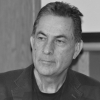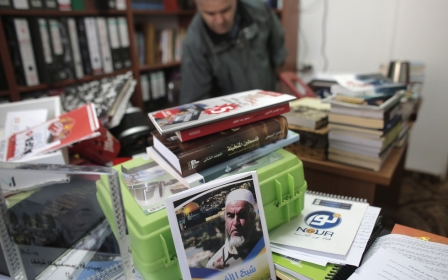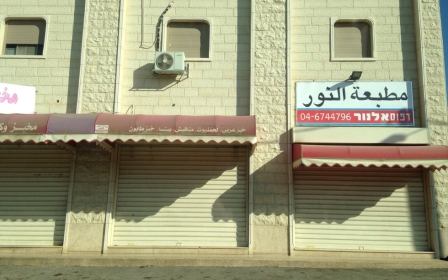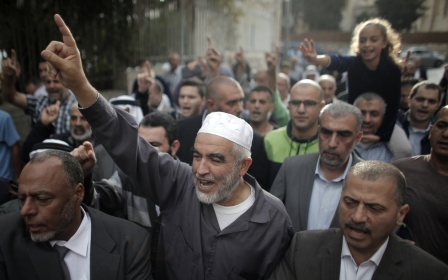Another crack in Israeli democracy
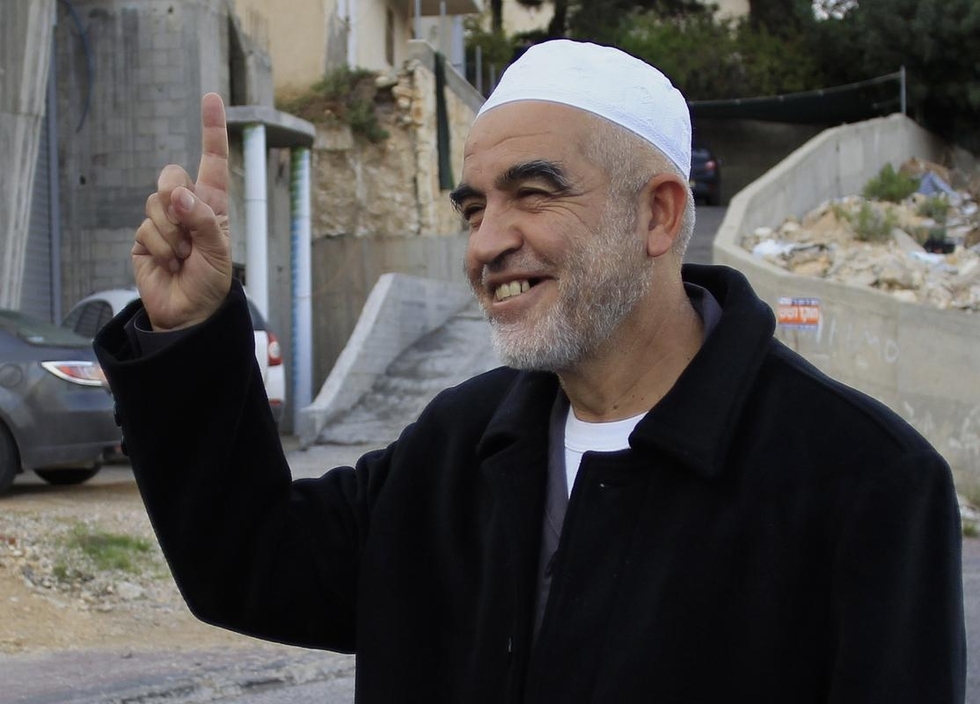
The decision by Israel’s defence minister and the current government to revoke the legal status of the northern branch of the Islamic Movement in Israel opens another crack in the democratic regime that rules half of Israel.
Israel’s democracy is a very feeble one, in any case – lacking appropriate protections, without the required checks and balances, a democracy mainly directed at the country’s Jewish citizens. Not coincidentally, this scandalous decision relies on existing “emergency regulations,” a colonialist remnant of draconian legislation left to Israel by the departing British Mandate government – laws that Israel has never bothered to revoke. Under this rubric, the Israeli administration in power can do just about anything – which is why these laws, so useful at times, are still on the books.
This decision, moreover, was taken under cover of the recent terror attacks in Paris. There was nothing coincidental about Prime Minister Benjamin Netanyahu’s choice to exploit the global fury at Islam to move ahead with this action, which it had been contemplating, together with Israel’s security services, for a long time.
The perpetration of mass slaughter by Islamists in Paris makes it very easy to outlaw an Islamic movement in Israel. Netanyahu, in any case, apparently along with most Israelis, seems to view all of these people as jihadists, at least potentially – all Arabs, all Muslims, and certainly all Islamists.
The Islamic Movement in Israel was founded in the 1970s and was close to the Muslim Brotherhood. In 1996, the movement split in two: the northern branch, considered the more radical, which refrains from participating in the Israeli political game and publicly favours the boycotting of elections in Israel, and the southern branch, considered the more moderate of the two, whose representatives are elected to the Knesset, Israel’s parliament. It is the northern branch, headed by Sheikh Raed Salah, that has now been outlawed.
Salah, a former mayor of Umm al-Fahm, is slated to begin serving an 11-month prison sentence soon, for incitement based on statements he made in East Jerusalem a few years ago. This is not the first prison sentence for Salah, considered a dangerous enemy by the Israeli government and security establishment.
In recent years, Salah has devoted his energies mainly to what he calls the defence of the Al-Aqsa mosque, which, he says, is in danger. He is popular with Palestinian citizens of Israel, but just how popular is difficult to measure because his movement has never stood for election. Stripping the movement of its legal standing, which could mean the imprisonment of anyone connected with it, including its educational, social welfare and charity organisations, and the confiscation of all its property, would of course change the nature of its activity, and perhaps even strengthen the movement.
Israel’s General Security Services understands this and was opposed to the revocation of the movement’s legal standing, deeming the move overly extreme. The GSS people thought this step might provoke radical reactions among the Palestinian public in Israel and further radicalise the atmosphere in that sector. The GSS also emphasised that there is no evidence for a connection between the Islamic Movement in Israel and terrorism.
But Netanyahu and Defence Minister Moshe Ya’alon decided to ignore the counsel of the professionals, or else the GSS people may have finally changed their minds and agreed with the position taken by the government and the defence minister. In any case, the decision has evoked a vigorous response among Palestinian citizens of Israel. Determined opponents of the Islamic Movement, secular people and leftists, Christians and liberals, found themselves making common cause with the movement in a demonstration of solidarity and protest at the extreme action taken against it. The Arab public, most of which as already noted are opposed to Salah’s movement, declared a one-day general strike, and more protests are likely to follow.
Any Arab child in Israel knows that this step was not the first and is certainly not going to be the last in the process of delegitimising and demonising the Palestinian citizens of Israel, commonly referred to in Hebrew as “the Arabs of Israel”. Any Palestinian child also knows that this act is but another in a series of discriminatory and disinheriting steps.
The far-right Jewish movements, which are much more dangerous and violent and publicly call for attacks on Arabs, notably the fascist organization Lehava, remain legitimate in Israel, while only the Islamic Movement is criminalised. Until now, the only other Arab organisation to be outlawed by Israel was the secular Al-Ard movement that arose toward the end of the 1950s and was banned for challenging the idea of Israel as a Jewish state.
History offers many examples of organisations and movements that were forced underground, often followed by two developments: the movement became more radical after having been pushed to the wall, and sometimes also became more influential and more powerful thanks to its persecuted status. This could very well be the case now with the Islamic Movement in Israel. Forcing it off the legitimate playing field of Israeli politics and society is liable to morph it into a subversive underground, working in secret, possibly with even more support and a greater following. No matter what, the sentiments and worldview of its supporters cannot be altered by any government decree.
One need not be a supporter of the Islamic Movement in order to be energetically opposed to its being outlawed, just as one need not be a supporter of the extreme Jewish right-wing movements in order to oppose their being outlawed. Any person who breaks the law belongs in court and possibly in prison. But outlawing an entire movement must be seen as an illegitimate act that presages a slide down the slippery slope.
If there is evidence that could incriminate public figures, including heads of extremist political movements, that evidence should be used in court and the suspects brought to trial. Others who incite or otherwise violate the law should be made to answer for their deeds, but criminalising a whole movement, against which the evidence is negligible, is an action intolerable in a democratic regime, however nationalist or otherwise reprehensible the organisation’s views may be considered. Israeli law already has enough mechanisms in place to bring people to trial for alleged incitement and security violations.
Right now, the northern branch of the Islamic Movement in Israel is an illegal organisation. Anyone who thinks that this is the last movement that will be criminalised in Israel is living in denial regarding the dangerous anti-democratic trends manifesting themselves in Israeli society in recent years. Today Sheikh Raed, tomorrow Hanin Zoabi, and the day after that, perhaps, a radical leftist Jew. Today the Islamic Movement, tomorrow the secular Balad party, and the day after that, who knows? Maybe even Haaretz. And it might not end there, either.
- Gideon Levy is a Haaretz columnist and a member of the newspaper's editorial board. Levy joined Haaretz in 1982, and spent four years as the newspaper's deputy editor. He was the recipient of the Euro-Med Journalist Prize for 2008; the Leipzig Freedom Prize in 2001; the Israeli Journalists’ Union Prize in 1997; and The Association of Human Rights in Israel Award for 1996. His new book, The Punishment of Gaza, has just been published by Verso.
The views expressed in this article belong to the author and do not necessarily reflect the editorial policy of Middle East Eye.
Photo: Sheikh Raed Salah, the leader of the Islamic Movement in Palestine, poses for a picture on November 17, 2015 in Nazareth town. Israel has banned the movement known for campaigning for Jerusalem’s Al-Aqsa Mosque, accusing them of “incitement and propaganda". (AFP)
New MEE newsletter: Jerusalem Dispatch
Sign up to get the latest insights and analysis on Israel-Palestine, alongside Turkey Unpacked and other MEE newsletters
Middle East Eye delivers independent and unrivalled coverage and analysis of the Middle East, North Africa and beyond. To learn more about republishing this content and the associated fees, please fill out this form. More about MEE can be found here.


